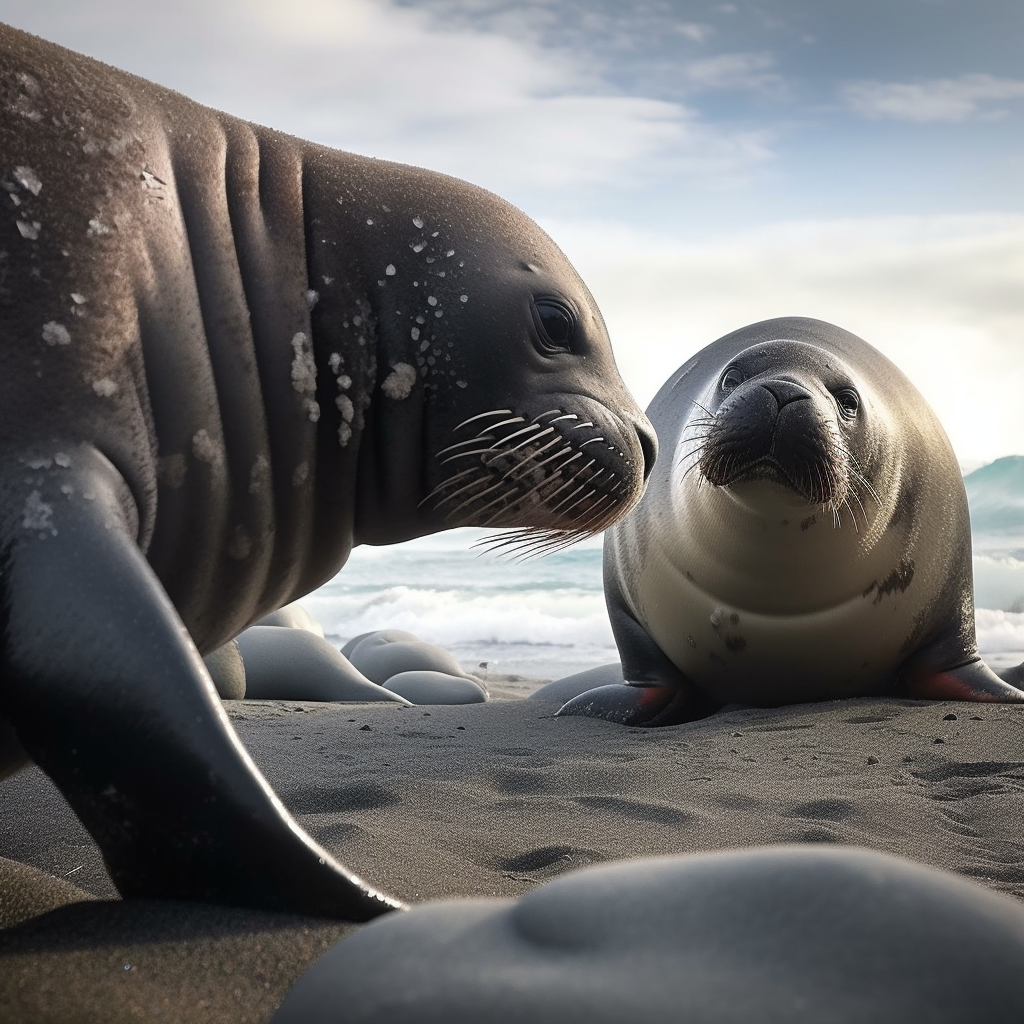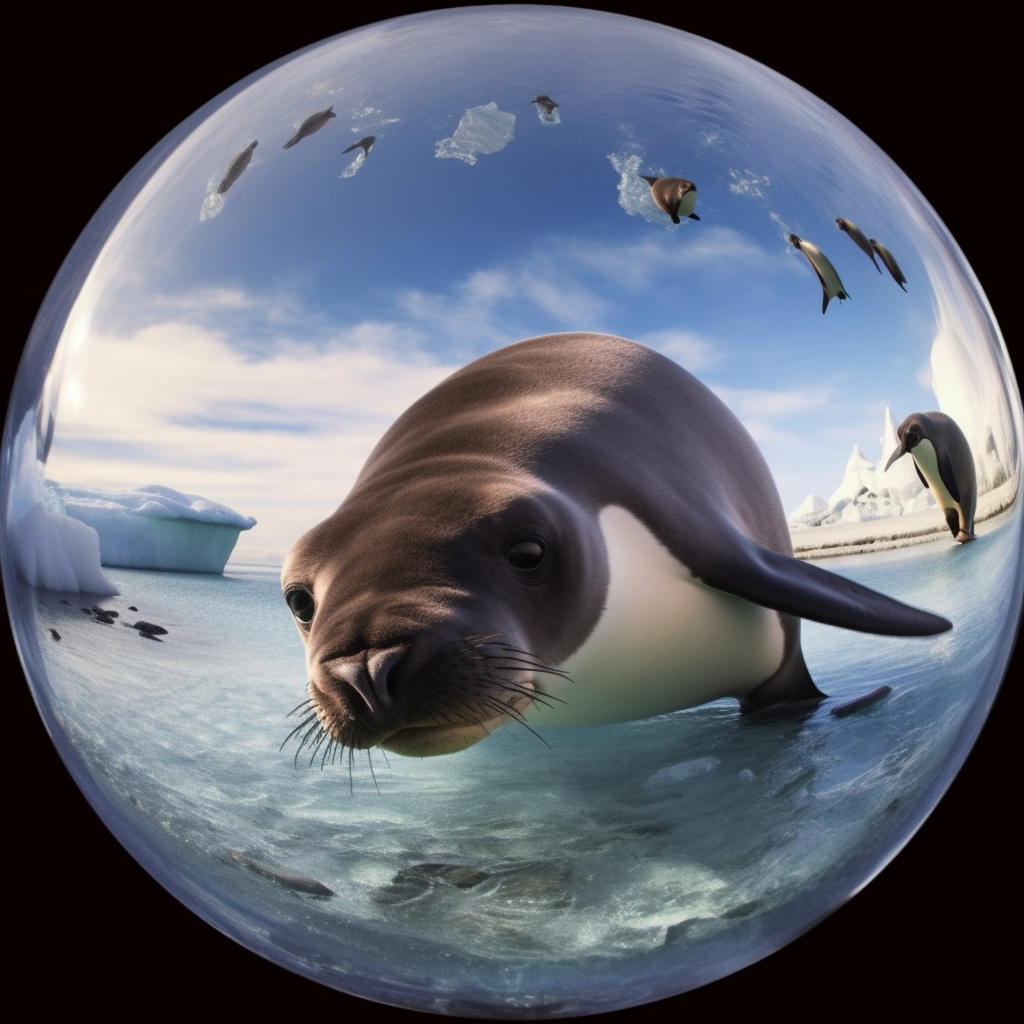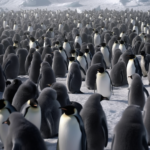Do Elephant Seals Eat Penguins?
Introduction:
Elephant seals are fascinating creatures that inhabit the cold waters of the Southern Hemisphere. These massive marine mammals are known for their impressive size and unique adaptations. While they primarily feed on fish and squid, there have been instances where elephant seals have been observed preying on penguins. In this article, we will explore the relationship between elephant seals and penguins, shedding light on whether or not these seals actually eat penguins. We will delve into the feeding habits of elephant seals, their preferred prey, and the circumstances under which they may target penguins. So, let’s dive in and discover the truth behind this intriguing phenomenon.
Key Takeaways
- Elephant seals do not typically eat penguins as they primarily feed on fish and squid.
- While elephant seals are known to be opportunistic predators, their diet mainly consists of marine creatures found in their habitat.
- Penguins are not a significant part of the elephant seal’s diet, and interactions between the two species are rare.
Understanding Elephant Seals: An Overview

A. The Biology and Habitat of Elephant Seals
Elephant seals are fascinating creatures that inhabit the world‘s oceans, with their most prominent populations found in the cold waters of the Southern Hemisphere. These marine mammals are known for their massive size and distinctive trunk-like nose, which gives them their name. Let’s delve into the biology and habitat of these incredible animals.
Physical Characteristics
Elephant seals are the largest seals on Earth, with adult males, known as bulls, reaching lengths of up to 20 feet (6 meters) and weighing around 8,800 pounds (4,000 kilograms). Females, or cows, are significantly smaller, averaging around 10 feet (3 meters) in length and weighing approximately 1,800 pounds (800 kilograms). Their size and weight make them an impressive sight to behold.
One of the most distinguishing features of elephant seals is their large, inflatable proboscis, which is present only in adult males. This elongated nose serves multiple purposes, including producing loud roars during mating season and helping regulate body temperature by expelling excess heat.
Habitat and Range
Elephant seals are primarily found in the sub-Antarctic and Antarctic regions, where they breed and molt. They spend most of their lives in the open ocean, undertaking long migrations in search of food. During the breeding season, they return to specific beaches and rookeries to give birth and mate.
These marine mammals are well-adapted to cold environments, with a thick layer of blubber that helps insulate them from the frigid waters. They are also capable of diving to impressive depths, with some individuals reaching depths of over 5,000 feet (1,500 meters) and staying submerged for up to two hours.
B. The Diet of Elephant Seals: What Do They Typically Eat?
As top predators in the marine ecosystem, elephant seals have a diverse diet that consists mainly of fish and squid. Let’s explore what these impressive creatures typically eat and how their feeding habits impact the surrounding food chain.
Feeding Habits
Elephant seals are opportunistic feeders, meaning they will consume whatever prey is readily available in their environment. Their diet varies depending on their location and the time of year. During the breeding season, when they are on land, they fast and rely on their stored blubber for energy.
When at sea, elephant seals primarily target fish species such as hake, lanternfish, and myctophids. They also feed on squid, which they capture using their sharp teeth and powerful jaws. These marine giants are capable of consuming large quantities of food, with adult males consuming up to 100 pounds (45 kilograms) of prey per day.
Penguin Predators?
While elephant seals are formidable predators, they do not typically prey on penguins. Penguins, especially those found in the Antarctic region, have evolved to thrive in the harsh conditions and have developed various adaptations to avoid becoming prey. They are agile swimmers and can quickly escape from potential threats, including elephant seals.
It’s important to note that the relationship between elephant seals and penguins is not one of predator and prey but rather coexistence within the same marine ecosystem. Both species play vital roles in maintaining the delicate balance of the Antarctic food web.
In conclusion, elephant seals are magnificent creatures with unique biology and habitat preferences. Their diet consists mainly of fish and squid, and while they are powerful predators, penguins are not their typical prey. Understanding the feeding habits and interactions of these marine mammals helps us appreciate the intricate dynamics of the Antarctic ecosystem.
The Elephant Seal and Penguin Interaction: A Closer Look

A. Do Elephant Seals Eat Penguins: Unraveling the Truth
When it comes to the relationship between elephant seals and penguins, one question often arises: do elephant seals eat penguins? The answer is not as straightforward as it may seem. While elephant seals are known to be formidable predators, their diet primarily consists of fish and squid, rather than penguins.
Elephant seals are the largest seals in the world, with males reaching lengths of up to 20 feet and weighing over 8,000 pounds. These impressive creatures spend most of their lives in the ocean, coming ashore only to breed and molt. During their time at sea, they dive to great depths in search of food, often reaching depths of over 5,000 feet.
Penguins, on the other hand, are flightless birds that have adapted to life in the ocean. They are excellent swimmers and rely on their streamlined bodies and powerful flippers to navigate through the water. Penguins primarily feed on fish and krill, which they catch by diving beneath the surface.
While there have been rare instances of elephant seals preying on penguins, these occurrences are relatively uncommon. Elephant seals are more likely to target smaller prey that they can easily overpower, such as fish and squid. Penguins, with their agility and ability to swim quickly, are not typically seen as easy targets for elephant seals.
B. The Circumstances: When and Why Might Elephant Seals Eat Penguins?
Although elephant seals generally do not actively hunt penguins, there are certain circumstances where they may consume them. One such situation is when food sources are scarce. In times of food scarcity, elephant seals may resort to opportunistic feeding and target penguins as an alternative food source.
Additionally, elephant seals may accidentally encounter penguins while foraging for fish or squid. In these cases, if a penguin happens to be in the wrong place at the wrong time, it may become an unintended victim of an elephant seal‘s feeding behavior.
It’s important to note that these instances are relatively rare and do not pose a significant threat to penguin populations. Penguins have evolved various adaptations to avoid predation, such as their ability to swim quickly and their group behavior, which provides safety in numbers.
C. Why Don’t Elephant Seals Eat Penguins: The Other Side of the Coin
While there are occasional reports of elephant seals consuming penguins, it is essential to consider the broader ecological context. The relationship between elephant seals and penguins is more complex than simply predator and prey.
Elephant seals play a vital role in the marine ecosystem, and their feeding habits contribute to maintaining a balanced food chain. By primarily targeting fish and squid, elephant seals help regulate the populations of these species, preventing them from becoming overabundant and potentially disrupting the ecosystem.
Furthermore, penguins are an integral part of the Antarctic wildlife community. They are well-adapted to their environment and have evolved alongside other species, including elephant seals. The coexistence of these animals is a testament to the intricate web of interactions that shape the Antarctic ecosystem.
In conclusion, while it is possible for elephant seals to eat penguins under certain circumstances, it is not a common occurrence. Elephant seals primarily feed on fish and squid, and penguins have developed strategies to avoid predation. The occasional interaction between these two species highlights the complexity of the marine ecosystem and the delicate balance that exists within it.
The Elephant Seal’s Feeding Behavior: A Detailed Analysis
A. How Do Elephant Seals Hunt and Eat Their Prey?
Elephant seals are known for their impressive size and strength, but have you ever wondered how these magnificent creatures hunt and eat their prey? Let’s take a closer look at their feeding behavior.
When it comes to hunting, elephant seals primarily target fish and squid. They are opportunistic predators, meaning they will consume whatever is readily available in their environment. However, contrary to popular belief, penguins are not a staple part of their diet.
Elephant seals employ a hunting technique known as “cruising.” They swim slowly and steadily through the water, using their streamlined bodies to glide effortlessly. This method allows them to conserve energy while searching for potential prey.
Once an elephant seal spots its prey, it will use its powerful jaws and sharp teeth to capture and consume it. They have a remarkable ability to swallow their prey whole, thanks to their elastic stomachs that can stretch to accommodate large meals.
B. Does the Elephant Seal’s Diet Vary by Location and Season?
The diet of elephant seals can vary depending on their location and the season. These marine mammals inhabit different regions, including the Antarctic, sub-Antarctic islands, and parts of the Pacific and Indian Oceans. In each of these areas, the availability of prey differs, leading to variations in their diet.
For example, elephant seals in the Antarctic primarily feed on fish and squid species such as Antarctic silverfish and Antarctic toothfish. These prey species are abundant in the cold waters of the Southern Ocean, providing a reliable food source for the seals.
In contrast, elephant seals in the sub-Antarctic islands may have a more diverse diet. They have been observed consuming a wider range of prey, including krill, octopus, and various fish species. This adaptability allows them to survive in different ecosystems and adapt to the changing availability of food.
Furthermore, the diet of elephant seals can also vary seasonally. During the breeding season, when they gather on beaches to mate and give birth, they fast and rely on their blubber reserves for energy. After this period, they embark on foraging trips to replenish their energy stores, consuming larger quantities of prey.
In conclusion, while elephant seals are not known to eat penguins, they are fascinating creatures with unique feeding behaviors. Their hunting techniques and diet vary depending on their location and the season, allowing them to adapt to their environment and thrive in diverse marine ecosystems. Understanding their feeding habits is crucial for the conservation and preservation of these incredible animals and the delicate balance of the marine food chain they are a part of.
The Elephant Seal-Penguin Relationship: Myths and Misconceptions
A. Do All Elephant Seals Eat Penguins: Debunking Common Misconceptions
When it comes to the relationship between elephant seals and penguins, there are several myths and misconceptions that often arise. One of the most common misconceptions is that all elephant seals eat penguins. However, this is not entirely true.
While it is true that elephant seals are formidable predators, their diet primarily consists of fish and squid. They are not exclusively penguin hunters. In fact, only a few species of elephant seals have been observed preying on penguins, and even then, it is not their primary food source.
The misconception that all elephant seals eat penguins may stem from the fact that elephant seals and penguins often share the same habitat, particularly in the Antarctic region. This proximity can lead to occasional interactions between the two species, but it does not mean that elephant seals actively seek out penguins as their main source of sustenance.
B. Can an Elephant Seal Eat Penguins: The Physical Possibility and Its Implications
While it is true that some elephant seals have been observed hunting and consuming penguins, it is important to understand the physical limitations and implications of such behavior.
Elephant seals are massive creatures, with adult males weighing up to several tons. Their size and strength allow them to overpower and consume smaller prey, including penguins. However, penguins are agile and swift in the water, making it challenging for elephant seals to catch them.
Additionally, penguins have evolved various adaptations to evade predators, such as their streamlined bodies and excellent swimming abilities. These adaptations make it difficult for elephant seals to successfully hunt and capture penguins on a regular basis.
It is worth noting that the consumption of penguins by elephant seals, while not common, can have implications for the penguin population. If a significant number of elephant seals were to start targeting penguins as their primary food source, it could potentially impact the survival of certain penguin species, particularly those that inhabit the same areas as elephant seals.
However, it is important to emphasize that the occasional predation of penguins by elephant seals is a natural part of the marine ecosystem. Predation plays a crucial role in maintaining the balance of species within an ecosystem, and it is not uncommon for different species to interact in this way.
In conclusion, while it is true that some elephant seals have been observed eating penguins, it is not accurate to claim that all elephant seals do so. The occasional predation of penguins by elephant seals is a natural occurrence, but it is not their primary food source. Understanding the nuances of the elephant seal-penguin relationship helps dispel common myths and misconceptions surrounding these fascinating marine creatures.
The Future of Elephant Seals and Penguins: An Ecological Perspective

A. Will Elephant Seals Start Eating Penguins in the Future?
When considering the future of elephant seals and penguins, one question that often arises is whether elephant seals will start eating penguins. While it is true that elephant seals are formidable predators, known for their impressive size and hunting abilities, they do not typically prey on penguins as a primary food source.
Elephant seals primarily feed on fish, squid, and other marine creatures found in the ocean. They are known to dive to great depths in search of their preferred prey. Penguins, on the other hand, are flightless birds that primarily feed on fish and krill. They spend a significant amount of time in the water, but their hunting strategies differ from those of elephant seals.
While there have been rare instances of elephant seals preying on penguins, these occurrences are considered exceptions rather than the norm. It is important to note that the diet of elephant seals is influenced by their habitat and the availability of prey. As long as their preferred food sources remain abundant, there is no reason to believe that elephant seals will shift their diet to include penguins.
B. The Impact of Climate Change on Elephant Seal and Penguin Populations
Climate change is a pressing concern for many species around the world, including elephant seals and penguins. The changing climate has the potential to disrupt the delicate balance of ecosystems and impact the survival of various species.
For elephant seals and penguins, climate change can affect their habitats and food sources. Rising temperatures can lead to the melting of sea ice, which is crucial for penguins as it provides a platform for breeding and hunting. Without sufficient sea ice, penguins may struggle to find suitable nesting sites and access their prey, ultimately affecting their survival and reproduction rates.
Similarly, climate change can alter the availability and distribution of prey species that both elephant seals and penguins rely on. Changes in ocean currents and temperature can impact the abundance of fish and krill, which are vital food sources for these marine animals. If their prey becomes scarce or shifts to different areas, both elephant seals and penguins may face challenges in finding enough food to sustain themselves and their offspring.
Furthermore, the loss of sea ice and changes in ocean conditions can also result in increased competition among different species for limited resources. This competition can further impact the populations of elephant seals and penguins, as they may have to compete with other predators for food and breeding grounds.
In conclusion, while elephant seals do not typically eat penguins, the future of both species is intricately linked to the impacts of climate change. As we strive to mitigate the effects of climate change, it is crucial to consider the potential consequences for the delicate balance of marine ecosystems and the survival of these magnificent creatures. By understanding and addressing the challenges they face, we can work towards ensuring a sustainable future for both elephant seals and penguins.
Conclusion
In conclusion, while elephant seals are known to be formidable predators in the ocean, their diet primarily consists of fish and squid. Although they have been observed to interact with penguins, there is no evidence to suggest that elephant seals actively hunt and eat penguins as a regular part of their diet. These interactions are more likely driven by territorial disputes or curiosity rather than predation. Penguins, on the other hand, face threats from other predators such as sharks, sea lions, and killer whales. Understanding the complex dynamics between different marine species is crucial for conservation efforts and maintaining the delicate balance of marine ecosystems. By studying the feeding habits of elephant seals and their interactions with other species, scientists can gain valuable insights into the intricate web of life in the ocean.
Frequently Asked Questions
Q1: Do elephant seals eat penguins?
No, elephant seals primarily feed on squid and fish. Penguins are not a regular part of their diet. This is due to the difference in their habitats and hunting behaviors.
Q2: Does a elephant seals eat penguins?
As mentioned, elephant seals do not typically eat penguins. Their feeding habits are more focused on squid and fish, which are abundant in their marine ecosystem.
Q3: How do elephant seals eat penguins?
Elephant seals do not usually eat penguins. They have a different hunting behavior, which involves deep diving and foraging for squid and fish in the ocean depths.
Q4: Why don’t elephant seals eat penguins?
Elephant seals don’t eat penguins because they have different feeding habits and live in different layers of the marine ecosystem. Elephant seals are deep divers while penguins stay relatively close to the surface.
Q5: Do all elephant seals eat penguins?
No, not all elephant seals eat penguins. In fact, it’s rare for these seals to prey on penguins due to their different dietary preferences and hunting behaviors.
Q6: Can a elephant seals eat penguins?
While it’s physically possible, it’s not common for elephant seals to eat penguins. Their diet mainly consists of squid and fish, and their hunting behavior is adapted to deep-sea foraging.




